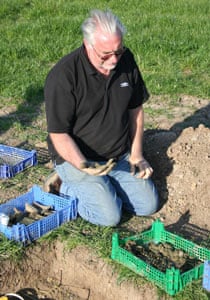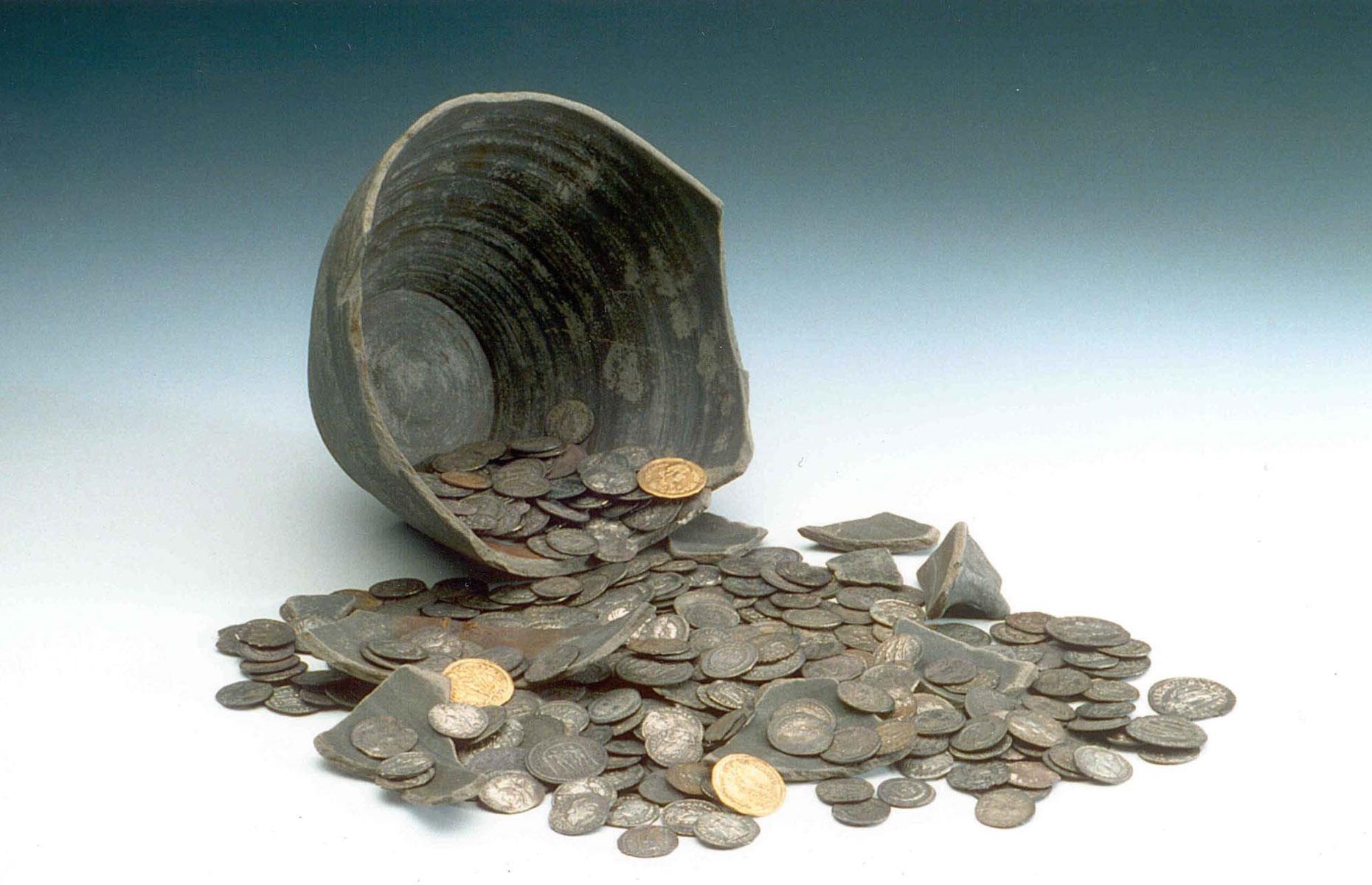
Metal detector enthusiast Dave Crisp could share £1m with owner of Somerset field where he unearthed 52,000 coins Steven Morris @stevenmorris20 Thu 22 Jul 2010 16.04 BST

Dave Crisp excavates part of the hoard of Roman coins he found in a pot in a field near Frome, Somerset. Photograph: Somerset County Council/PA
A metal detector enthusiast could share a £1m payout after finding one of Britain’s largest ever collections of Roman coins in a farmer’s field, it emerged today.
Dave Crisp, an NHS chef, was celebrating after a coroner ruled the find of 52,000 coins was treasure. It becomes the property of the crown and is bound to end up in a museum, but Crisp and the landowner will be rewarded once the hoard has been valued by an independent panel.
Crisp, 63, had spent more than 20 years hunting for buried treasure, with modest success. But he struck gold in April when he dug down a foot into the earth of a field near Frome, Somerset, and found a huge, well-preserved earthenware pot full of coins. Experts believe the coins had been deliberately buried in the third century as an offering to the gods by landowners hoping for favourable farming conditions.
Speaking after the hearing at East Somerset coroner’s court in Frome, grandfather-of-three Crisp said that he would continue with his hobby.
He said: “I’m over the moon. The money doesn’t really matter. Obviously it’s nice, but the significant thing for me is that I am the person who has made this discovery.
“I will keep working until I retire next year and will definitely continue with my hobby – you don’t just stop a hobby. I have no idea what I’ll spend the cash on. Maybe I’ll buy a new wok.
“People often compare metal detecting to trainspotting, or say it’s a bit geeky. Well, it just goes to show.”
The value of the hoard will not be known until it is examined in detail, but some experts have privately speculated it could run to hundreds of thousands of pounds and might even be worth up to £1m. The value will be split between Crisp and the landowner. Anna Booth, finds liaison officer for Somerset at the Portable Antiquities Scheme, said: “It will be fairly substantial, but how substantial, we don’t know.”
Over the years, Crisp, from Devizes, Wiltshire, has found coins, artefacts and jewellery of Celtic, Saxon, Victorian and Georgian origin. Earlier this year he found 62 coins scattered in the field near Frome, which he reported to the authorities, before returning for a second sweep. On 11 April, Crisp unearthed the haul of 52,503 coins.
Crisp told the coroner, Tony Williams, how he dug a foot beneath the surface after his metal detector emitted a “funny signal”. He dusted away the soil and found the pot full of treasure.
Crisp said: “I sat down and started to dig around and pulled out a bit of clay, which was attached to a pot. At first I found a coin, then another, then another. Then I realised what I had stumbled across and I literally stood up and shouted: ‘I have found a haul.’”
He alerted a finds liaison officer and a team of archaeologists was sent to study the site. Three days later they unearthed the pot, which was taken to the British Museum. It is thought to date from between AD253 and 293.
Crisp said: “Leaving it in the ground for the archaeologists to excavate was a very hard decision to take, but as it had been there for 1,800 years, I thought a few days more would not hurt. My family thought I was mad to walk away and leave it.”

Booth told the hearing the hoard was probably an offering to the gods for “favourable weather or good farming conditions”.
She said the pot was so heavy that whoever left it there did not intend to return to collect the contents.
Roger Bland, head of portable antiquities at the British Museum, said it was an extraordinary discovery. “It’s the largest hoard of coins that has even been found in a single pot,” he said. “In 1978, there was another find that was a little bit bigger but that was in two pots.
“We are at the beginning of understanding it properly. We have been able to wash and count all the coins and do a preliminary sort.”
He said most were bronze with about five silver coins that date back to the time of Emperor Carausius.
“He is not well known, this man,” said Bland. “He was a Roman commander who set himself up as emperor in Britain and ruled for seven years. To find such a big group of his coins will give us a lot of information about this episode in our nation’s history, which is not well understood.”
The Museum of Somerset is expected to try to raise the money to buy the coins to keep them in the county.